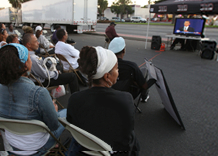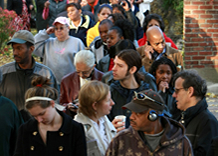I recently came across another story—the third in a few months—on economic turn around of disadvantaged who live in cities. Rather than add it to the other two in my May 2015 blog, I decided it deserved its own.
The NYT opinion piece is about the successful Houston nonprofit Neighborhood Centers, and its ‘bottom up’ approach to helping people lift themselves out of poverty. The author, David L. Kirp, writes that Neighborhood Centers “has enabled hundreds of thousands of poor residents, many of them immigrants, to move up the ladder of economic and educational opportunity each year. It’s a strategy that can — and should — be implemented nationwide.”
Though the nonprofit has been around for a long time, its growth in the last two decades has been “exponential”, and is largely attributed to the efforts of CEO Angela Blanchard. She sums up the orgs philosophy, saying “The people are the asset, the source of potential solutions, not the problem.”
The process is involved. “Hundreds of hours” are spent conducting community meetings and interviewing residents to identify priorities and community leaders, then funds are “cobbled together from 37 federal, state and local programs, with grants or contracts from the Departments of Education, Agriculture, Labor, Health and Human Services, Housing and Urban Development and the Treasury.”
The payoff has been big. Houston, one of the fastest-growing and most diverse cities in the nation, now has over 70 Neighborhood Centers across the city and surrounding suburbs, an annual budget of $270 million, and serves over 500,000 people.
And the results are concrete. Last year, jobs were secured for 110,000 people, 5,600 were trained for careers in welding and pipe-fitting—skills needed at the Port of Houston, and women were taught how to turn baking into a small business and to run a thrift store.
According to Kirp, “the organization also operates 14 high-caliber pre-kindergartens and charter schools. In every grade, charter students’ test scores were higher than in the neighborhood public schools.”
Other of its missions include free tax preparation, and teaching local leaders how to work the political system. The latter helped some “residents persuade the City Council to operate a new bus line”, giving them better access to grocery shopping and health clinics. It also encouraged two others to run for City Council, and enabled a group of 10th-grade boys to design, lobby for, and get a $400,000 skateboard park.
While it is gratifying to hear success stories like these from 3 different cities, they should be still more widely reported. A search of the trusty TVNews Archive* produced a few hits for “Houston Neighborhood Centers”, more than for either the Minneapolis or Atlanta stories (respectively, a sprinkling on CSPAN; none), though none on major networks. Most of these reports are set in the context of an ‘urban renaissance’, which many experts claim has been happening for some time. I’ve included video of a few, along with their highlights, below.
Fareed Zacharia aired an 8 minute segment about Houston on his CNN show in June of 2014. Only a 2 minute excerpt was available on the website (below), but the full report can be found on TVNews Archive, here, in 1 minute segments.
(short ad)
In it, Zacharia starts with big picture brushstrokes: “Houston was the first city to regain all of the jobs it lost in the 2008 recession. It actually created more than two jobs for every one it lost.” Touching on immigration, Neighborhood Centers’ CEO Angela Blanchard relates how, during a time when the issue was politically heated, she had to refute misinformation from the media on a daily basis in order to raise funds, and, in the end, Houston came together and solved its problems. With video of Neighborhood Centers as a backdrop, she suggests its long term benefits: “This is the world they (children) will remember. That is a powerful way to make a community safer. Belonging is the most powerful medicine.”
On his show about cities, after a brief introduction, Charlie Rose interviews co-authors Jennifer Bradley and Bruce Katz on their book “The Metropolitan Revolution” (10 min. long). Though the scope of the discussion is cities in general, Houston is singled out as an example.
(short ad)
Some quotes—
Bruce Katz: “The real power is in cities and metropolitan areas because they are the engines of the economy.”, “[The] top 100 metros sit on 1/8 of the land mass, [and represent] 2/3 of the population and 3/4 of GDP.”
Jennifer Bradley: “Metro’s are not just governments, they are networks (of companies, philanthropic groups and individuals); they can fund things in a more creative or interesting way, … a whole lot of resources open up.”, “Cities need to come together and demand change in Washington.”
Following their segment, Mr. Rose interviews Columbia’s Center for Urban Real Estate director and “A Country of Cities” author, Vishaan Chakrabarti (15 min.), who says “Cities are a silver bullet to solve most of the major problems we have in this country, and by extension, the world.” He goes on from there.
All interviews inspire hope.
What is particularly interesting about the Houston story is how its model contrasts with those of Minneapolis and Atlanta. In those two cities, there was some backslide from the initial success of their models which had been imposed, top down, on the communities, rather than organically grown, bottom up, as in Houston.
In this recent News Hour report (7 min. long), Harvard’s Raj Chetty discusses his study on urban areas and the high correlation between where a child grows up, and their chances of upward mobility. He states (paraphrasing): “We can’t move everyone out of poor cities like Baltimore. We have to fix the cities.”
(no ads)
On the question of how to fix them, Houston has clearly added more, and important, data to that of Atlanta and Minneapolis. Now, let’s get the media to report it.
ATD Rule break: Cover The Topic.
*Note: The TVNews Archive database may have data gaps, though none were uncovered in the use of it for this blog. (more info)
Additional References:
TVNews Archive Network List



{ 0 comments… add one now }